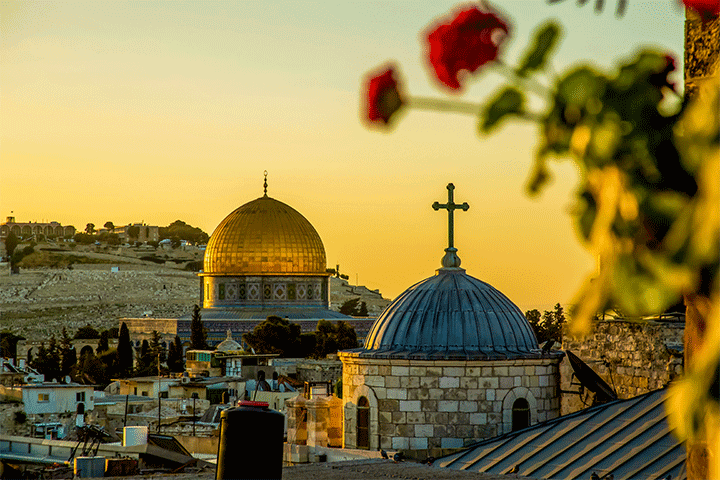In the Middle East, two significant religious observances, Ramadan and Easter, bring joy and reflection to millions of people each year. These holy occasions, rooted in Islam and Christianity respectively, hold deep cultural and spiritual significance for Arab communities. While distinct in their practices, Ramadan and Easter also reveal the beautiful harmony that exists between the two religions.
Ramadan
A Month of Devotion and Reflection. Ramadan in Arabic known as رمضان /Ramadhaan/, the ninth month of the Islamic calendar, is when Muslims worldwide dedicate themselves to fasting صيام /Syaam/, prayer صلاة /Salaah/, and self-reflection. It commemorates the month when Allah revealed the first verses of the Qur’an to Prophet Muhammad through the angel Gabriel. Lasting for 30 days, Ramadan is an opportunity for Muslims to cleanse their souls and deepen their connection with Allah.
During daylight hours, Muslims abstain from food, drink, smoking, and other worldly pleasures as an act of self-discipline and devotion. Fasting serves as a reminder of the importance of compassion, empathy, and gratitude for the blessings in life. Muslims wake before sunrise for a snack which they call it سحور/suHoor/, a pre-dawn meal that sustains them throughout the day. As the sun sets, families and communities gather for إفطار /’ifTaar/ which means breakfast, where delicious meals are shared in an atmosphere of togetherness and generosity.
Ramadan, رمضان, /ramadhaan/
Fasting, صيام, /Syaam/
Prayer, صلاة, /Salaah/
A Pre-Dawn Meal, سحور, /suHoor/
Breakfast, إفطار, /’ifTaar/
Easter
The Resurrection and Renewal for Christians in the Middle East, Easter in Arabic known as الفصح /al fiSH/ holds immense spiritual significance as it commemorates the resurrection of Jesus Christ يسوع المسيح /yasooʻ almaseeH/. Easter is celebrated with great enthusiasm and reverence. The preparations begin 40 days before Easter with Lent, a period of fasting, prayer, and reflection. Christians abstain from dairy and meat products during this time, contemplating the sufferings of Christ.
Palm Sunday known in Arabic as أحد الشعانين /’aHad alshaʻaaneen/, a week before Easter, marks the beginning of the Holy Week الأسبوع المُقَدَّس /al’usbooʻ almuqaddas/. Families dress in their finest attire, and children carry beautifully decorated candles into churches, symbolizing hope and renewal. The apex of the Holy Week is Good Friday, also known as /janaazat almaseeh/ a day of deep reflection on the crucifixion of Jesus. Finally, Easter Sunday أحد الفصح /’aHad alfiSH/ arrives, and Christians joyfully celebrate the resurrection of Jesus Christ, followed by a period of rest and relaxation.
Easter, الفصح, /alfiSH/
Jesus Christ, يسوع المسيح, /yasooʻ almaseeH/
The Big Holiday, العُطلة الكبيرة, /alʻuTlah alkabeerah/
Palm Sunday, أحد الشعانين, /’aHad alshaʻaaneen/
Holy Week, الأسبوع المقدَّس, /al’usbooʻ almuqaddas/
Good Friday, الجمعة العظيمة, /aljumʻah alʻaDHeemah/
Easter Sunday, أحد الفصح, /’aHad alfiSH/
Harmony and Shared Traditions Despite the Religious Distinctions
During these festive seasons, the Middle East showcases the harmony between Islam إسلام /’islaam/ and Christianity المسيحية /almaseeHyyah/. Arab Christians, while celebrating Easter, extend gestures of goodwill to their Muslim neighbors. Traditionally, Christian families make kind of sweets which are called معمول /maʻmool/, date-filled shortbread cookies, during Holy Week, different kinds of sweets are shared with Muslim neighbors as a sign of unity and friendship.
Similarly, during Ramadan, Muslims engage in acts of charity they call it زكاة /zakaah/, one of the Five Pillars of Islam, which requires Muslims to provide alms to the poor and support their local mosques. The spirit of generosity extends to neighbors of different faiths, fostering a sense of community and shared values.
In the Arab world, the greeting المسيح قام /al maseeH qaam/ (Jesus has risen) echoes through churches during Easter, and the response حقاً قام /Haqqan qaam/ (He has truly risen) reflects the shared belief in the resurrection of Jesus. These exchanges exemplify the mutual respect and understanding that exist between Muslims and Christians, as they honor and celebrate each other’s faith traditions.
Islam, إسلام, /’islaam/
Christianity, المسيحية, /almaseeHyyah/
Kind of Sweets, معمول, /maʻmool/
Jesus’ Christ resurrection, قيامة المسيح, /qyaamat almaseeH/
Act of Charity, زكاة, /zakaah/
Jesus has Risen, المسيح قام, /al maseeH qaam/
He has Truly Risen, حقاً قام, /Haqqan qaam/
In conclusion, Ramadan and Easter hold great significance for Muslims and Christians in the Middle East. They are occasions of deep spirituality, reflection, and communal celebration. As Muslims observe Ramadan’s fasting and devotion, Christians commemorate it.
Let Kaleela take you step-by-step through the roots of the language all the way to out into Arabic dialects. Along the way, you learn the five main skills of learning any language – reading, writing, listening, speaking, and culture.
To make learning even easier for you, Kaleela also brings you convenience. No more trying to fit learning Arabic into your schedule or finding a course that’s close to home. With Kaleela, you’ll learn Arabic where you want and when you want – all at your own pace.
Try Kaleela now and Learn Arabic the Right Way.



